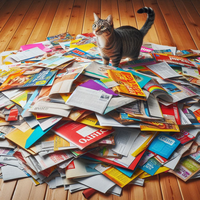Corporate America’s Bold Eco-Initiative

Turning Your Mailbox into a Recycling Plant
In an age of climate crisis and environmental concern, Corporate America has once again risen to the challenge with a revolutionary, highly sophisticated, totally-not-pointless sustainability program: The Great Paper Roundabout™. This groundbreaking initiative involves printing billions of unsolicited advertisements, coupons for expired yogurts, and catalogs from stores you’ve never entered, then lovingly depositing them into mailboxes across the country. The goal? To give the American public a chance to participate in the paper recycling process directly from the comfort of their own homes.
The system is beautiful in its simplicity and even more beautiful in its inefficiency. Here’s how it works: corporations spend millions of dollars designing glossy, full-color advertisements. These are printed on paper sourced from forests that—let’s be honest—probably had it coming. The advertisements are then shipped to distribution centers, packaged by minimum-wage workers who just wanted to be actors, and finally delivered to homes via fleets of gas-powered vehicles. The recipient, you, the eco-conscious citizen, then plays your critical role by taking the ad directly from your mailbox and placing it into your recycling bin—mission accomplished.
A Paper Trail of Progress
"We wanted to do our part to save the planet," said Gavin Stapleton, Senior Vice President of Circular Sustainability Initiatives at MegaAd Corp, a company whose mission statement is literally “We Sell You Stuff You Didn’t Know You Needed.” Stapleton sits in a sleek office surrounded by artisanal succulents and inspiration posters that say things like “Synergy is Just Energy with an S.”
“Our studies showed that Americans were simply not getting enough paper into their recycling bins. So we thought, why not help them? Why not deliver the paper directly to their homes? Pre-sorted. Pre-folded. Sometimes even with a little ‘15% off Tires’ coupon as a thank-you for saving the planet.”
According to internal estimates from the newly created Department of Environmental Hype, this initiative has resulted in a 500% increase in consumer-based recycling of irrelevant mail. Or as the report puts it, “We’re getting hella bins full, bro.”
The Role of the Consumer
Unlike traditional recycling efforts, which require people to remember what items go into what bin and whether pizza grease disqualifies cardboard from redemption (spoiler: it does), this new system empowers consumers by making the process blissfully mindless.
“I don’t even read the stuff,” says Brenda McFarlane, a suburban mom in Iowa whose mailbox is so full it occasionally hemorrhages circulars onto her lawn like a paper piñata. “I just grab it, maybe glance at a Kohl’s coupon that expired yesterday, and then toss the whole pile straight into the recycling. I feel like Greta Thunberg when I do it.”
Experts agree this method of participation offers the psychological satisfaction of helping the Earth without the inconvenience of doing literally anything else.
“We call it Active Passivity,” explains Dr. Dana Greenfield, a sociologist at the Institute of Consumer Behavior and Vaguely Progressive Thoughts. “The consumer is actively engaging in passive sustainability. It’s brilliant. It’s like composting, except without the smell, or the nutrients, or the actual benefit to the soil.”
Junk Mail: The New Green Currency
In the boardrooms of major corporations, junk mail has been rebranded not as a waste product, but as a renewable resource. This is marketing wizardry on par with turning tap water into "artisan hydration experiences." Companies are quick to point out that these paper-based advertisements are biodegradable, recyclable, and emotionally manipulative—a triple threat.
Some companies have even taken it a step further. Fast fashion giant ThreadGoblin now includes a complimentary three-page ad in every online order, printed on 110% recycled paper that previously housed important government documents from 1997.
“We’ve closed the loop,” said a ThreadGoblin spokesperson. “You buy a pair of $5 jeggings, and we give you paper to throw away. That paper becomes more jeggings. It’s the circle of unsustainable life, now with a green tint.”
Carbon Footprint? More Like Carbon Ballet
Critics of the program, usually fringe radicals who “care about things” and “read facts,” have pointed out that printing billions of pieces of junk mail annually might not actually help the environment.
To this, Corporate America has responded with grace, panache, and a PowerPoint slide that includes a stock photo of a toddler holding a plant.
“Sure, each individual ad might leave a tiny carbon footprint,” Stapleton admitted while drinking imported mineral water from a glass bottle shaped like a teardrop. “But think of the broader picture. We’re educating people. We’re reminding them that recycling exists. And if we can do that while also promoting our new bacon-scented laundry detergent, everybody wins.”
Logistical experts have crunched the numbers and confirmed that the emissions created by printing, processing, and distributing junk mail only outweigh the environmental benefit of recycling it by a factor of who's asking?
The Greenwashing Gala
In a dazzling event sponsored by three oil companies and a bottled water conglomerate, The Great Paper Roundabout™ won this year’s “Eco-Initiative of the Year” award. The award, a solid gold sculpture of a dolphin hugging a garbage can, was accepted by various brand mascots, including a polar bear wearing sunglasses and a talking tree named PromoPine.
“By partnering with consumers to throw away what we send them, we’re building a better future,” declared the award ceremony’s host, a man dressed as a compost bin with human legs.
Not to be outdone, the federal government is reportedly considering tax breaks for corporations that can prove their advertising mail contains at least 20% recycled buzzwords like “sustainable,” “green,” and “ethically sourced ink.” There are also rumors of a government-sponsored "Junk Mail Olympics," where citizens can compete in speed-sorting catalogs and shot-putting Bed Bath & Beyond flyers.
The Future of Paper Waste
With the success of the paper mail recycling initiative, new programs are already in development:
- Plastic Palooza™: where corporations ship you single-use plastic wrappers to throw away for them.
- E-Waste Fiesta: where you're sent broken USB drives full of spam emails to responsibly discard.
- Air Emissions Home Edition™: where companies send you tiny combustion engines so you can experience the thrill of CO2 release in your living room.
There’s even talk of an upcoming campaign to mail pre-creased paper so it fits more easily in your recycle bin. It's called “Fold for the Future™.”
As we look ahead to a warming planet and rising seas, Corporate America stands tall—on a mountain of glossy, recyclable ad inserts—confident that we can solve environmental problems by mailing them directly to your door and trusting you to throw them away. Because if there’s one thing you can count on the American public to do consistently, it’s throw stuff away.
And isn’t that what saving the planet is all about? Just throwing things in the right bin and feeling pretty good about it?
Stay tuned next week for our exposé on how microplastics are helping children build stronger immune systems.
Mind Detour offers humorous, educational and interesting articles and videos to detour your mind from the everyday grind.
Be sure to follow us on Twitter and like our page on Facebook.
Thank You for visiting my site, I really appreciate it! Please do me a huge favor and share my articles with your friends on social media.



